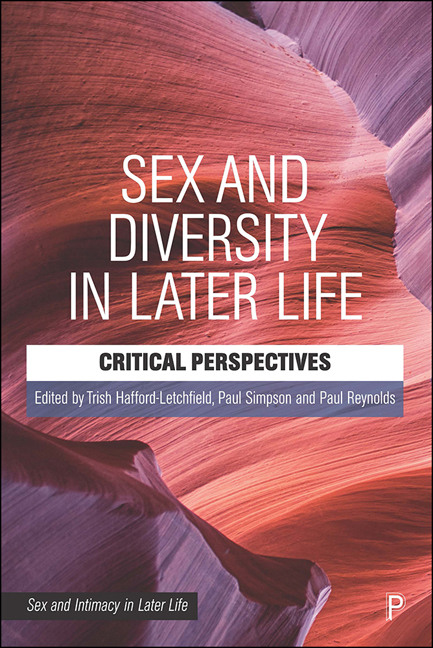Book contents
- Frontmatter
- Dedication
- Contents
- List of figures and tables
- Notes on editors and contributors
- Series editors’ introduction
- Foreword
- 1 Sex and intimacy in later life: a survey of the terrain
- 2 Sexual expression and pleasure among black minority ethnic older women
- 3 Sexual desires and intimacy needs in older persons and towards the end of life
- 4 Heterosexual sex, love and intimacy in later life: what have older women got to say?
- 5 Sex and ageing in older heterosexual men
- 6 Sex and older gay men
- 7 Thinking the unthinkable: older lesbians, sex and violence
- 8 Splitting hairs: Michel Foucault’s ‘heterotopia’ and bisexuality in later life
- 9 The age of rediscovery: what is it like to gender transition when you are 50 plus?
- 10 Ageing asexually: exploring desexualisation and ageing intimacies
- 11 Older people, sex and social class: unusual bedfellows?
- 12 Final reflections: themes on sex and intimacy in later life
- Index
8 - Splitting hairs: Michel Foucault’s ‘heterotopia’ and bisexuality in later life
Published online by Cambridge University Press: 21 December 2021
- Frontmatter
- Dedication
- Contents
- List of figures and tables
- Notes on editors and contributors
- Series editors’ introduction
- Foreword
- 1 Sex and intimacy in later life: a survey of the terrain
- 2 Sexual expression and pleasure among black minority ethnic older women
- 3 Sexual desires and intimacy needs in older persons and towards the end of life
- 4 Heterosexual sex, love and intimacy in later life: what have older women got to say?
- 5 Sex and ageing in older heterosexual men
- 6 Sex and older gay men
- 7 Thinking the unthinkable: older lesbians, sex and violence
- 8 Splitting hairs: Michel Foucault’s ‘heterotopia’ and bisexuality in later life
- 9 The age of rediscovery: what is it like to gender transition when you are 50 plus?
- 10 Ageing asexually: exploring desexualisation and ageing intimacies
- 11 Older people, sex and social class: unusual bedfellows?
- 12 Final reflections: themes on sex and intimacy in later life
- Index
Summary
This chapter reflects on both the sexual intimacies of the ageing bisexual and the limited research on such lived experiences of bisexuality in later life. Here I consider these two areas as an example of Michel Foucault's ‘heterotopia’; as a space that is, paradoxically, both connected to, and disconnected from, the ageing gay and lesbian imaginary (Foucault, 1967, p 3). This chapter also demonstrates how the ‘dynamic and fluid’ complexities of lived bisexuality in later life, within mononormative care practices, ensure that older bisexual intimacies have historically existed (and continue to exist) as a ‘bitopia’ (Beemyn and Eliason, 1996, p 7). This ‘bitopia’ is defined here, within the conceptual framework of Foucault's ‘heterotopia’, as the simultaneous inclusion and exclusion of older bisexual intimacies and sexual practices from cultural, institutionalised and socio-historical discourses. I posit here that such practices and discourses are sustained by ideologies informed by long-established paradigms of what many bisexual scholars describe as ‘mononormativity’ and ‘monosexual subjectivity’, which describe assumptions that a person is exclusively hetero-or homosexual, indicated by the gender of their current partner (Garber, 1995, p 5; Monro, 2015, p 3). A central focus here is to utilise a literature review to identify how this lived ‘bitopia’ of older bisexuals in later life continues to be repressed, policed and sustained within a ‘landscape of compulsory monosexuality’ and how this repressive bi/heterotopia affects sexual practices and intimacies for older bisexuals (James, 1996, p 220). Furthermore, this chapter interrogates the reasons why older bisexual intimacies remain both part of, and excluded from, the sexual intimacies of the ageing lesbian and gay communities.
Foucault's ‘heterotopia’ and bisexual intimacies in later life
Bisexuality is often added as a footnote or at the end of a list of sexual minority groups. The B in LGBT is both an invisible and a silent letter, yet, paradoxically, also the largest letter. Consequently, it has long been contended that bisexual identities and sexual acts of intimacy exist, operate and are regulated as a silenced majority within an existing minority (Wolff, 1979; Klein, 1993; Garber, 1995; Ault, 1996; Hemmings, 1997; Angelides, 2001; Lingel, 2012; Barker and Langdridge, 2014; Monro, 2015). As of 2017 in the UK, 0.7 per cent of people identify as bisexual compared with 1.3 per cent of people who identify as either gay or lesbian (Guy, 2019).
- Type
- Chapter
- Information
- Sex and Diversity in Later LifeCritical Perspectives, pp. 139 - 162Publisher: Bristol University PressPrint publication year: 2021



